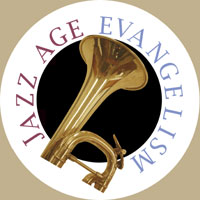

|
Music
|
Handbill
announcing the Tabernacle's 1931 Sacred Choir Concert, one of the ministry's
many musical events. Click on the image above to see an enlargement. |
Excerpt (2 minutes) from tape T1 in Collection 268, oral history interview with Helen Lowery (attended the Tabernacle and volunteered in its programs) recorded by Bob Shuster on March 26, 1984.
SHUSTER: You've mentioned how many musical activities there were at the Tabernacle. Why do you think there was such an emphasis on music?
LOWERY: I think it was a music...part...I
think the music played a big part in drawing people to the Tabernacle, because
I don't think churches at that time had as much music as they have now. I know
the little church we went to before we started going to the Tabernacle, we had
the traditional organ. That's to have played the hymns that were right there
and...and if it wasn't printed on the page they didn't play it. The same with
the pianist. And you had...you had a choir that sang the ordinary old hymn and
really didn't do anything big. I don't think that music became such a part of
our worship, or was such a part of the worship until.... I think Mr. Rader probably
promoted it because he was rather flamboyant and he wanted all of these things
going. And he had these musicians. And he wanted everybody to take part in everything.
And he just used everything he had. You know he gave you both barrels all the
time. And I think people were won to the Tabernacle. That was one reason they
came, was because there was so much music and there was so much joy in the music.
And it was spontaneous and you never know, he'd turn and say, "Why don't
we do..." whatever it was, and he'd...and Merrill [Dunlop] and Lance [Latham]
would sit down. Lance would be at the organ and Merrill would be at the piano
and they'd take off in a key and the congregation would start singing and away
we would go. And then it just became better music, because you had an educated
man like Merrill who...who knew these anthems and these works of art.
Leave the exhibit to read the descriptive guide of the Lowery collection